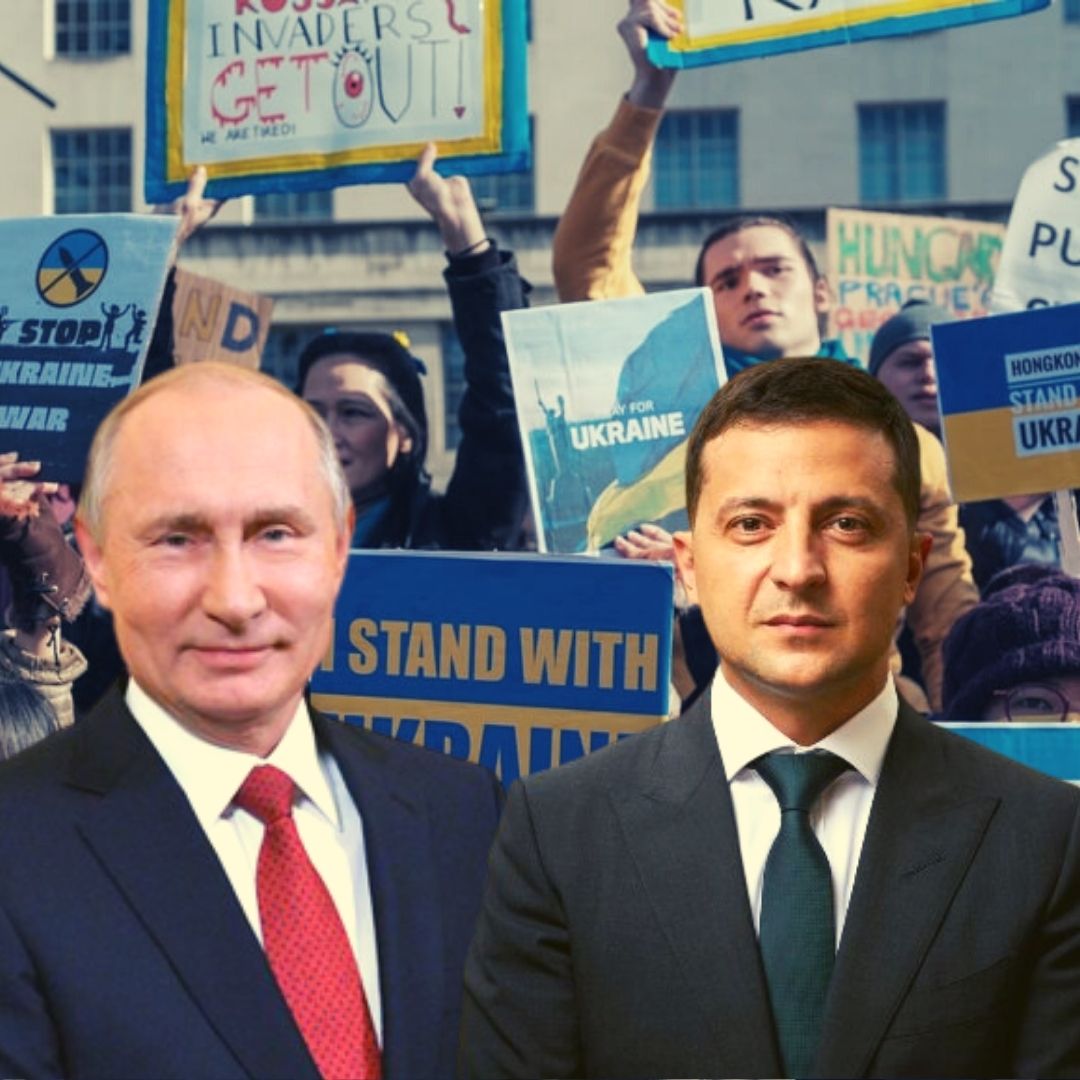Ukraine Demands Ceasefire, Troops Withdrawal Before Russia Talks: Here Are The Top Developments
Writer: Tashafi Nazir
For most people, journalism sounds hectic and chaotic. For her, it's a passion she has been chasing for years. With an extensive media background, Tashafi believes in putting efforts on presenting a simple incident in the most interesting way.
Others/World, 28 Feb 2022 12:06 PM GMT
Editor : Snehadri Sarkar |
While he is a massive sports fanatic, his interest also lies in mainstream news and nitpicking trending and less talked about everyday issues.
Creatives : Tashafi Nazir
For most people, journalism sounds hectic and chaotic. For her, it's a passion she has been chasing for years. With an extensive media background, Tashafi believes in putting efforts on presenting a simple incident in the most interesting way.
Russian President Vladimir Putin ordered Russian nuclear deterrent forces to be put on high alert even as Zelenskyy agreed to start peace talks. He called the country's defence minister and the chief of the military's General Staff to put the nuclear deterrent forces in a "special regime of combat duty".
Ukraine on Monday (February 28) demanded an immediate Russian ceasefire and troop withdrawal as a Kyiv delegation arrived for talks with Russian negotiators on the fifth day of the Kremlin's offensive against the country.
In a statement, the Ukrainian presidency said that the Ukrainian delegation arrived at the Ukrainian-Belarusian border to participate in talks with representatives of the Russian Federation.
"The key issue of the talks is an immediate ceasefire and the withdrawal of troops from Ukraine," the presidency said.
Talks At Belarus Border
Earlier, Ukrainian President Volodymyr Zelenskyy agreed to start peace talks with Russia. Following a phone call with Belarusian strongman Alexander Lukashenko, Zelenskyy's office said he had agreed to send a delegation to a meeting on the Belarusian-Ukrainian border near the Pripyat River. The talks would be the first to take place since Russia invaded Ukraine.
On the other hand, Russian troops entered Kharkiv, the country's second-largest city, on the fourth day of Russia's invasion of Ukraine, where fierce fighting was reported. The city's mayor later stated that Ukrainian forces have repelled the Russian attempt to seize Kharkiv.
Putin's Nuclear Threat
Meanwhile, Russian President Vladimir Putin ordered Russian nuclear deterrent forces to be put on high alert even as Zelenskyy agreed to start peace talks.
Amid tensions with the West over his invasion of Ukraine, Putin has ordered Russian nuclear deterrent forces put on high alert. He called the country's defence minister and the chief of the military's General Staff to put the nuclear deterrent forces in a "special regime of combat duty". His order created a threat that the tensions with the West over the invasion of Ukraine might lead to the use of nuclear weapons.
Jens Stoltenberg, Secretary-General of Nato, said Putin's nuclear rhetoric is "dangerous". "This is dangerous rhetoric. This is a behaviour which is irresponsible," Stoltenberg said.
"And of course when you combine this rhetoric with what they are doing on the ground in Ukraine – waging war against an independent, sovereign nation, conducting full-fledged invasion of Ukraine – this adds to the seriousness of the situation," he added.
Russia Destroys World's Largest Plane
Ukraine's Antonov-225 cargo plane, the largest aircraft in the world, was destroyed by Russian strikes outside Kyiv on the fourth day of Moscow's invasion.
"Russian invaders destroyed the flagship of the Ukrainian aviation, the AN-225" at the Antonov airport in Gostomel near Kyiv, Ukraine's state-owned Ukroboronprom group said.
The aircraft was unique to the world at 84 meters long (276 feet). It could transport around 250 tonnes (551,000 pounds) of cargo at a speed of up to 850 kilometres per hour (528 mph).
Germany To Increase Defence Spending
Chancellor Olaf Scholz said Germany would sharply increase its spending on defence to more than 2 per cent of its economic output in one of a series of policy shifts prompted by Russia's invasion of Ukraine.
Germany this week also halted its Nord Stream 2 gas pipeline project with Russia and agreed to send weapons to Ukraine after prolonged resisting pressure from Western allies on both issues and facing accusations of being too dovish towards the Kremlin.
The country has long resisted pressure from the United States and others to raise its defence spending to 2 per cent of economic output in the light of its 20th-century history and resulting in solid pacifism among its population.
Europe Opens Its Doors For Ukrainian Refugees
On Sunday, more than 360,000 people have fled Ukraine in the three days since Russia began its invasion, the UN refugee agency (UNHCR) said.
Some walked miles through the night while others fled by train, car or bus, forming lines kilometres long at border crossings with neighbouring countries: Poland, Moldova, Hungary, Romania and Slovakia. Some even fled into Belarus.
Those arriving were primarily women, children and the elderly after Ukrainian President Volodymyr Zelenskyy prohibited men of military age from 18 to 60 from leaving.
UNHCR said that 368,000 had fled Ukraine, with 45,200 arriving in Poland in just 15 hours.
The agency's spokesman, Chris Melzer, said there were queues of 14 kilometres at the Poland-Ukraine border and waiting times of 40 hours.
The agency expects up to four million Ukrainians could flee if the situation worsens further.
Also Read: Raman Effect! Here's How CV Raman Discovered 'Why Sea Is Blue'
 All section
All section















